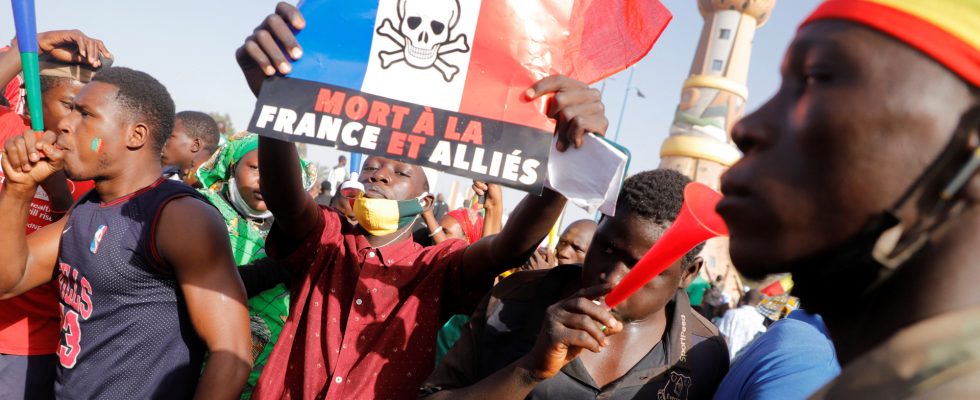Status: 04/09/2023 3:34 p.m
France is increasingly losing influence in the Maghreb and the Sahel. Many African countries accuse the former occupier of neocolonialism. Where does this new anti-French attitude come from?
The French daily newspapers “Le Monde” and “Libération” described the decision of the military junta in Burkina Faso to throw its female correspondents out of the country as unacceptable and arbitrary. The government in Ouagadougou is thus once again restricting the freedom of the French media. A few months ago, she switched off the Radio France Internationale channel and last week the TV channel France 24.
It helps to see the process as part of a larger development. A development that could be called the fall of France in Africa.
Wagner mercenaries instead of France’s troops
Since 2018, French soldiers have been stationed in Burkina Faso as part of the Barkhane mission to oust Islamist terrorists. But the jihadists still control around 40 percent of the country. Incomprehension and outrage in the country are great.
Burkina Faso’s government still denies that it is now working with mercenaries from the Russian Wagner Troops instead of France, but many people in Burkina Faso assume that they are already fighting on their soil. In Mali they do it officially, commissioned by the military government in Bamako.
Withdrawal from the Sahel
France has now withdrawn its soldiers from both Burkina Faso and Mali. That’s right, says Malian student Fatome Boussanga, representing many people in the Sahel: “The Wagner mercenaries are there for our common interests and long-term development. The French, on the other hand, just want us to believe that we have common interests. In truth But they only care about their own interests.”
In the fight against Islamist terrorism, many are fine with any means. Or as the political analyst Mohamed Ibrahim Yattara puts it: “I’m a pragmatist. It doesn’t matter to me whether a cat is black or white. The main thing is that it catches mice. So if we find partners, no matter what country, we’ll fight terrorism to fight, then bring it on!”
France has now withdrawn its soldiers from both Burkina Faso and Mali. Instead, Russia’s Wagner mercenaries are said to be active in both countries.
Image: dpa
Russia stirs up resentment
A development is underway that worries many in Paris. So also the French ex-foreign minister Dominique de Villepin. In an interview with the France Inter broadcaster, he said: “Africa is rebelling against us. Many are demanding that France leave Africa. It is wrong to think that these countries are neutral. They are a lever of world politics that Russia is currently using served.”
De Villepin thinks the West is making things far too easy for Russia and China. They tackle infrastructure projects and fuel the anti-Western propaganda machine. According to de Villepin, France and the rest of the West should actually go to all the capitals in Africa, convince them and explain their own policies there.
Criticism of ex-colonial power
But many in the former colonies no longer want anything to do with the French. Moroccan political scientist Rachid Touhtou says: “France has failed since independence in the 1960s. Look at all the French ex-colonies. They are underdeveloped. Take their educational systems. They’re the worst in the world . France should be ashamed.”
Instead of just acting in its own interest and exploiting Africa’s resources, Touhtou said France should rethink its Africa strategy – “or leave it to China, the USA and Russia so that more prosperity is created”.
Much of the criticism is correct: in relation to the former British colonies, the countries formerly occupied by France are often worse off economically and educationally. Nevertheless, Jacob Ross of the German Council on Foreign Relations believes that Paris cannot be held responsible for all the misery in these countries: “Anyone who argues like this makes it far too easy for themselves and, above all, for the regimes and governments there.”
“Maghreb countries move away from France”
There was a big dispute between France and Morocco last year. France had announced it would only issue half as many visas to citizens of the Kingdom as it refuses to take back expelled citizens. This dispute has still not been resolved. For Touhtouh, however, this is just the tip of the iceberg.
Morocco and the other Maghreb countries are increasingly moving away from France, the political scientist observes: “France’s investments in Morocco will decrease in the next five to ten years. We can already see that with the Al Boraq high-speed train, which is based on the TGV, that Morocco is trying to to get rid of French investors.”
France’s presence in European interest
Ross is milder in his judgment. Sooner or later the African states would also have to realize that Russia and China were acting very selfishly and that the USA was not prepared to fill the gap left by France. Nevertheless, French President Emmanuel Macron has so far failed to put French Africa policy on a new footing.
France keeping a foot on the continent is not only in France’s interests, but also in Europe’s. No matter how strained relations may be, no other European country in Africa is as deeply rooted as France.
A new era: France’s difficult position in the Maghreb and the Sahel
Jean-Marie Magro, ARD Studio North West Africa, April 5, 2023 3:49 p.m

